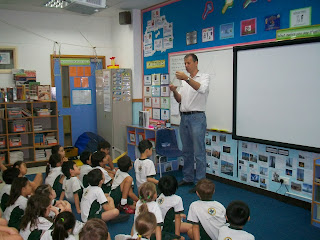Without keeping you in suspense any longer, the answer is:
What makes you say that?
Think is the 12th most used verb in English, yet how much of it do we actually do? Not enough, according to much of the research into teaching and learning, and certainly not enough according to the state of our world. How much could a little more thoughtfulness (in terms of thinking
and kindness) entirely change our planet and how it conducts its business?
That being said, how do we actively encourage students to think more deeply and not just give rote answers to simple questions? The dead easy sentence - What makes you say that? - can help students explain, describe, justify, expand, and, most importantly,
think about why they are saying what they are.
So often students (and normal civilians) just answer what they believe the other person wants to hear. When asked to explain, however, they are at a loss for words. If you want your students to start actually thinking about what they are saying or writing or doing, all you need to do is regularly ask, "
What makes you say that?"
This simple prompt causes a neuron jump to the next level of brain activity. It doesn't let you off at the first bus stop, but makes you get out of the suburbs and into the inner city of your brain.
"
What makes you say that?" is slowly becoming a part of our classroom vocabulary. I encourage students to use it with each other in their partner or collaborative groups. For example, if they're working to solve a mathematical word problem and Grinelda says, "The teacher ate 69 apple pies," the other students in her group should immediately say, "
What makes you say that?" and she should be able to explain her answer, or alternately respond, "Hang on a second, there's NO way she could have eaten that many pies without throwing up; maybe I'm wrong. Let me think through it again."
My teaching goal is to institutionalise this question so students are constantly having to elaborate, explain and justify in their speaking, their writing, and across all disciplines. It's a simple practice that, from the first day you start using it, will make your students more alert, more tuned-in, more likely to understand or to try to understand, and much more willing to explore their own ways they think about the universe and all of its many questions.
(By the way, it's also a great way to encourage intellectual discourse when speaking to people with whom you ardently disagree, whether it be on politics, religion or whether gluten-free or dairy-free is better. Rather than causing dissent and hard feelings by arguing (unless you enjoy doing so), you can simply say, "
How interesting. What makes you say that?" Then you can smile and nod as your companion either succeeds in persuading you or talks himself down the rabbit hole. For me, I love it, because it takes me right out of the controversy that I shy away from, and people think I'm a good listener.)
If you are more interested in learning about this and other simple "thinking routines," visit Harvard's Project Zero site at
http://www.pz.gse.harvard.edu/visible_thinking.php











